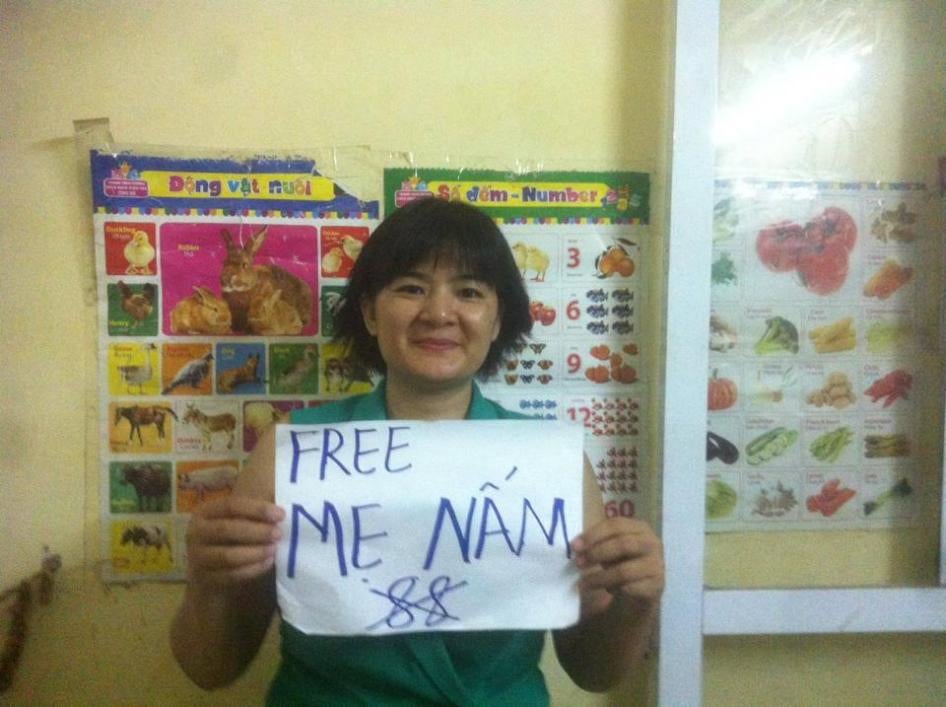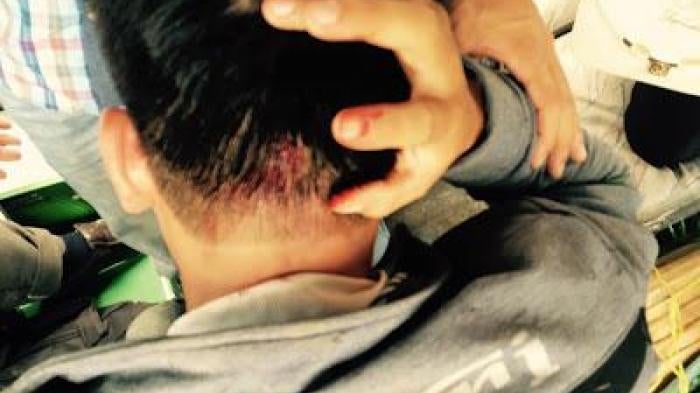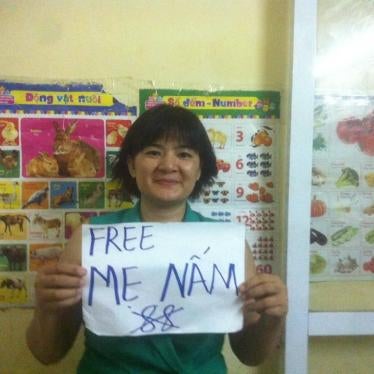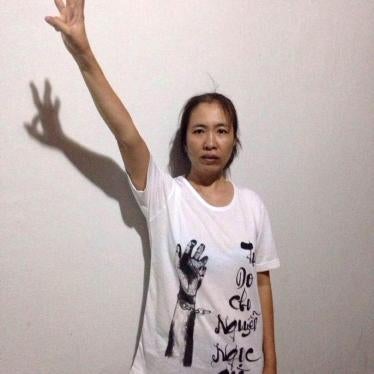Update: On July 25, 2017, the People’s Court of Ha Nam sentenced 40-year-old rights activist Tran Thi Nga to nine years in prison for “conducting propaganda against the State of the Socialist Republic of Vietnam.” Upon release, she will serve an additional five years of probation restricting her movement within her residential ward. Human Rights Watch called for this verdict to be quashed and for Tran Thi Nga to be immediately released.
(Bangkok) – Vietnam should immediately release rights activist Tran Thi Nga and drop the charges against her, Human Rights Watch said today. Tran Thi Nga, also known as Thuy Nga, is set to face trial on July 25, 2017, at the People’s Court of Ha Nam province. The authorities arrested her on January 21 for “conducting propaganda against the state” under article 88 of the penal code.
“The Vietnamese government consistently goes to extremes to silence its critics, targeting activists like Tran Thi Nga with bogus charges that carry a long prison sentence, and subjecting their families to harassment and abuse,” said Phil Robertson, deputy Asia director. “Foreign donors should use their leverage to push for Tran Thi Nga’s release now, and make it clear that closer relations depend on Vietnam tolerating its critics, rather than sending them to prison.”
Tran Thi Nga, 40, will appear in court one month after fellow rights activist Nguyen Ngoc Nhu Quynh, also known as “Mother Mushroom,” was sentenced to 10 years in prison under article 88 in a one-day trial. Mother Mushroom’s long prison sentence raises significant concerns that other activists facing national security charges like Tran Thi Nga may also be hit with harsh penalties for exercising their rights.
State media reported that Tran Thi Nga was arrested for having “accessed the internet to post a number of video clips and articles” critical of the government. She faces up to 12 years in prison under clause 1 of article 88, one of the country’s draconian national security provisions which has been regularly used to arbitrarily punish critics and stifle dissent. Article 88 recasts peaceful political speech as “propaganda against the state” deserving of harsh sanction. As a national security offense, article 88 also allows for detained individuals to be held incommunicado during the investigation period under Vietnam’s Criminal Procedure Code.
Tran Thi Nga’s arrest is part of Vietnam’s ongoing crackdown on bloggers and activists who have been charged with vaguely interpreted national security violations. More than 100 activists are currently imprisoned for exercising their basic freedoms of expression, assembly, association, and religion. Vietnam should unconditionally release them and repeal all laws that criminalize peaceful expression.
Tran Thi Nga is a longtime labor rights activist who has fought against abuses including trafficking, police brutality, and land confiscation. She has participated in environmental protests, attended trials of bloggers and activists, and visited the houses of political prisoners to show solidarity. She served as an executive board member for Vietnamese Women for Human Rights (VNWHR), founded in November 2013.
Vietnamese officials have subjected Tran Thi Nga to years of intimidation, harassment, and physical assault in response to her consistent political activism. In May 2014, she was attacked on the street in Hanoi by a group of five men in civilian clothes who beat her with iron rods, breaking her arm and leg. The targeted attack was filmed, yet police declined to investigate the incident despite the video evidence. In March 2015, security agents in Hanoi detained her and took her back to her hometown in Ha Nam province. During the trip, one man twisted her neck and gagged her so she could not call for help. Two other men restrained her hands and legs, while a fourth man slapped and punched her.
The attacks against Tran Thi Nga are part of a broader pattern of violent assaults against rights campaigners across Vietnam. In a June 2017 report, Human Rights Watch documented 36 cases of bloggers and activists being intimidated, threatened, and beaten by thugs, sometimes in direct view of police, who usually failed to intervene, investigate, or arrest assailants. Human Rights Watch also found that some victims such as Tran Thi Nga were later arrested under article 88, raising the question of the authorities’ ties to the assailants. The Vietnamese government should order an end to all attacks and hold those responsible accountable.
According to her lawyer, Ha Huy Son, Tran Thi Nga is in worsening health in the Ha Nam Detention Center where she is being held. Her requests to seek medical treatment at a hospital in June 2017 were denied.
Tran Thi Nga is part of a growing community of Vietnamese rights bloggers and activists who use Facebook and YouTube to voice criticisms, share updates about protests and detainees, and support one another in their struggles for political freedom. Yet, in serving as a catalyst for peaceful activism, the internet has also become the latest arena for the government’s crackdown on critics. In addition to arresting activists for their online activity under national security laws, the government has blocked Facebook access during large-scale protests and pressured multinationals to pull advertising from the social media sites.
“The thugs who threatened and attacked Tran Thi Nga are precisely the ones who should be facing investigation – not someone who spoke out against rights violations happening in her country,” Robertson said. “The government’s efforts to suppress peaceful expression online and on the ground have only made its critics more determined in asserting their fundamental right to free speech.”










